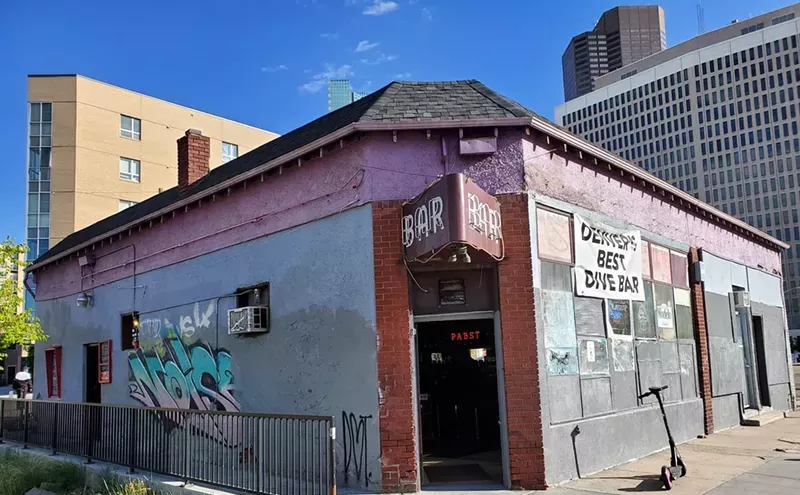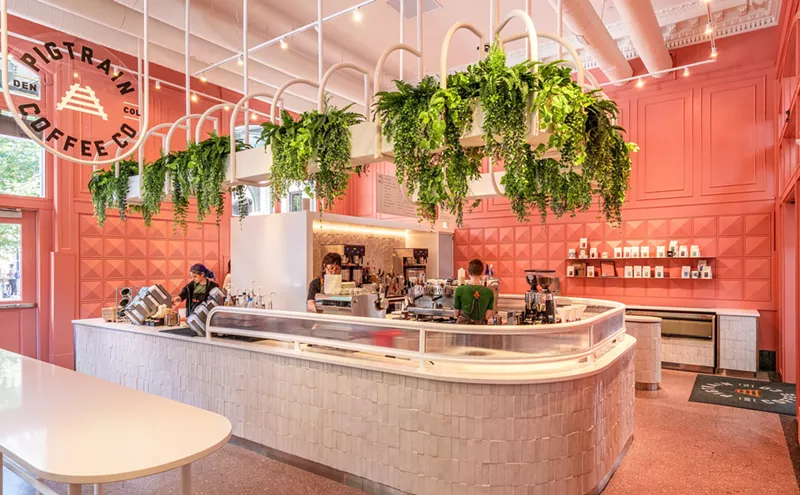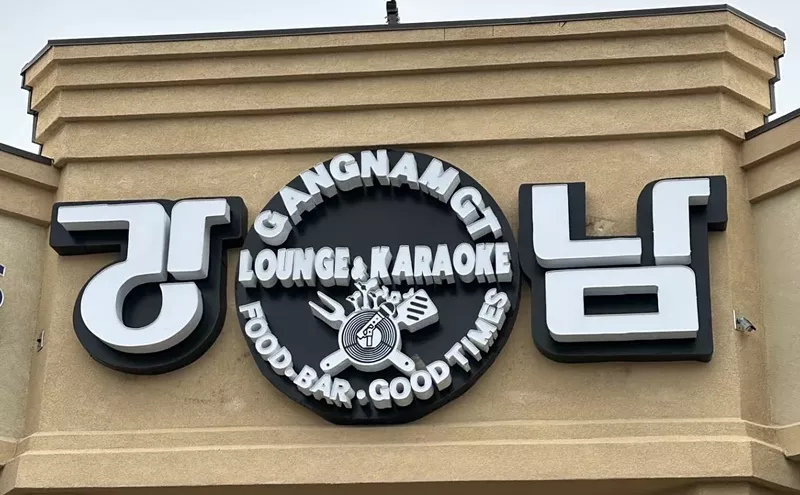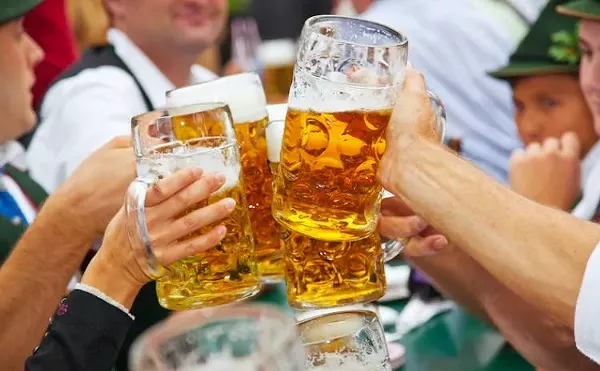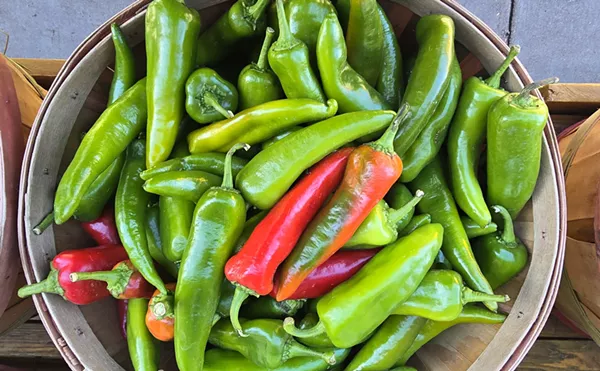It was the year of the entrepreneur and the restaurateur," says Jim Pittenger, owner of Biker Jim's Gourmet Dogs. After six years of slinging sausages from street carts, he opened his own brick-and-mortar outpost at 2148 Larimer Street this past spring.
And Pittenger has a point. By our count, close to 300 restaurants have opened in metro Denver in 2011, a big increase over last year, when just over 200 concepts — many of them food trucks — arrived on the scene.
This year several of those food trucks' owners — like Pittenger and Kevin Morrison, owner of Pinche Taqueria, which opened in October at 1514 York Street — picked up permanent addresses. "Our goal was to test the market with the truck during one season," Morrison explains. "We would have opened earlier, but we couldn't find the right location."
Pittenger went indoors after he "got tired of taking phone calls on Sunday afternoon," he says. "They'd say, 'Hey, is this the hot dog guy? Where you at?' And then I'd say, 'You know it's snowing out, right? And you know I'm a cart, right? I'm at home in my underwear. Where you at?' It's nice to say, 'We're at 22nd and Larimer.' That was a good enough reason to get the doors open on the place."
But Pittenger also acknowledges that nailing down the right spot was a deciding factor. "The Ballpark neighborhood worked out pretty perfectly for us," he says. "Two blocks from Coors Field is a pretty good place to have a hot dog place." Or a pizza place. Or a Scandinavian place. The stretch of Larimer that's home to Biker Jim's has become a veritable restaurant row, with his hot dog joint, Trillium and Ignite joining a lineup that already included Marco's Coal-Fired Pizzeria, Snooze, Hi-Rise, twelve and a few longtime Larimer institutions like Mexico City Lounge and Herb's Hideout.
Why there? "Parking's a little better than downtown," says Pittenger. "The neighborhood is still sketchy enough to be interesting. And rental rates are still a little cheaper than downtown, though not a ton. It's pretty up-and-coming, and a lot of people are living in that neighborhood now. There's a good shot that eighty days out of the year, you're going to do pretty well with a ballgame going on within a couple of blocks."
Ryan Leinonen, who opened Trillium at 2134 Larimer earlier this month, agrees. "The north end of Larimer is still up-and-coming," he says. "There's the ballpark, and the residential tide is turning. In a couple of years, that area is going to be more expensive." And, he adds, "I wanted to be surrounded by other destination restaurants."
So did Aaron Lobato, who — along with his brother, Andre, and their friend Joey Newman — opened a second restaurant, the Crimson Canary, at 141 South Broadway in the also up-and-coming Baker neighborhood, just a few years after they'd put Interstate Kitchen and Bar, their first venture, in the Santa Fe Art District. "With the location of Interstate, we knew it was going to be a fight," he explains. "We thought, 'Can we keep this thing alive for five years and then maybe really grow?' It's a developing neighborhood, and we knew we had to be in the show. It's not a fight we wanted to do over. The old Mona's spot was a more ideal location. People are already out and on that street spending money on food and drink. We just have to convince them to give us our fair share."
Robert Thompson, who opened Le Grand Bistro and Oyster Bar in August at 1512 Curtis Street and plans to open Punch Bowl in February in the Baker neighborhood, also thinks that area is a good bet. "Baker has had its own momentum for ten years," he explains. "The Hornet was the pioneer in the neighborhood. Since then, Baker has had a train that got moving and got moving slow, but it built up steam and it'll be hard to stop. Baker will go through another change, and it will be more food- and restaurant-influenced as opposed to focused on bars."
A few blocks of Alameda made for a third hot stretch of restaurant real estate in 2011: Bittersweet opened at 500 East Alameda Avenue just in time for the ball drop, and a handful of other restaurants moved into the area north of Washington Park. "There's a lot of good exposure here and a lot of volume of traffic," explains Eric Rivera, the chef who opened Cafe|Bar at 295 South Pennsylvania Street at the beginning of October. "This spot was perfect. There's a marketing opportunity of having the building here." Plus, there was the prospect of diversifying restaurant options in the area. "There are seven Asian restaurants within a block and a half, and there's Bittersweet on the high end, but there's little else in between," Rivera notes.
And once he and partner Dane Huguley found the spot, they weren't about to be deterred by the still-lousy economy. "If you open when it's the toughest, you'll survive later on," Rivera says.
They weren't the only entrepreneurs to take that tack. "People would say, 'Are you crazy? You're opening a restaurant in this economy?'" recalls Diane Coohill, who opened Coohills with her husband, nationally recognized chef Tom Coohill, at 1400 Wewatta Street this fall. "But we were going to all these restaurants, and they were packed."
While the wallet squeeze didn't deter the Coohills from moving forward with their plans, it did dictate the type of restaurant they would open. In Atlanta, they were lauded for their French fine-dining spots. Here in Denver, they opted to open a more casual iteration. "Back in the '90s, our check average would be $80 to $100 per person," Diane explains. "It's not nearly that much now. We rely more on the volume and keeping the bar busy, and we promote the restaurant for what makes us unique." As a result, their diner has changed, too. "We're seeing people from all income levels coming in, which was what we really wanted to see," she says. "They can make it a fine-dining experience, or order mini-burgers and flatbread pizza and have a beer. It's still fine-dining service, though, and we're not compromising the food."
Other restaurateurs were wary of white tablecloths and polished silver, as well. "I wanted to stay true to the Ballpark neighborhood, which is so casual," Leinonen says. "I want to pull the regular Ballpark crowd and people looking for fine dining, but I also want to pull people who are going to the Rockies game to come sit at the bar and have a beer and an app in their shorts. It's approachable fine dining. You can come have a great meal for a reasonable price, but the food and service is impeccable."
Lobato and his partners haven't given up on fine dining; they've just pocketed those concepts for later use. "We're still not in the position where we feel like our luxury concepts are a wise position," he explains. "We don't want to take on a luxury concept. We don't want to be a place where people have to break the bank."
But Thompson, who has brought nine restaurants to the metro area over the years, says that he'll continue to steer away from the high-end route for the foreseeable future...and maybe forever. "I've always opened up quality, bang-for-your-buck type concepts," he says. "I don't really do white-tablecloth. It'd be fun to do, but I don't believe in it for the long haul. Economic conditions have to stay stable for a long time to support $60 and $70 check averages. On the higher end, you have to look at things differently to survive."
Denver may not be getting a lot of spendy new restaurants, but it's getting interesting concepts from creative restaurateurs — and diners are embracing concepts they once rejected.
"In 2003, I opened up an amazing restaurant called Brasserie Rouge, which I eventually closed because we lost money for thirteen months," Thompson recalls. "We got a little ahead of ourselves. Le Grand is an iteration of the same concept, and it's already doing far better than my best weeks or months at Brasserie Rouge. Denver has really embraced and taken pride in its local restaurant concepts. Denver's finally coming into its own as a food city."
That change is what encouraged Leinonen to open his restaurant in Denver after spending several years in kitchens in Boulder. "When I first moved out here, I was all about Boulder," he explains. "It's a wonderful town, and I saw myself working at Boulder restaurants; I didn't think of Denver as a food town. It was all brewery, brewery, brewery, steakhouse. But look at what's opened in the last few years: Bonanno, Table 6 and Fruition just exploded. That explosion was the catalyst." And he's convinced that a changing Denver is ready for his particular brand of cuisine. "Scandinavian food has always been deep in my heart, but you don't really see it outside of people's homes and New York or San Francisco," Leinonen says. "I thought the time was right. It's a big risk, but I'm bringing people along with me."
The Coohills were in Atlanta when that city's restaurant scene boomed, and they draw a comparison between what happened there and what they're seeing here. "Denver is just starting to make its mark," says Diane. "There's so much potential. And we've never seen such strong support as this community gives."
So what's next? "I see local guys creating concepts that are uniquely Denver," says Thompson, "and I want to be part of the exportation of Denver. I want other people to say, 'Jeez, we gotta see what's going on in Denver and bring it to our home town.' Portland's a great example of that. It's a small market, but people are exporting it. Denver has the potential to be similar." He'll make good on that commitment, too, when he opens another Punch Bowl in Portland at the end of next year.
Pittenger has similar expansion plans. "We have a re-creatable concept," he explains. "This is our trainer model. I learned a lot in the past nine months about running a restaurant. I would love to see the Biker Jim brand expand." He's working on moving to other cities — such as Los Angeles, Austin, Seattle and New York — via trucks, but opening another restaurant is a possibility, too.
Still, he sees plenty of room for growth here at home. "The Denver food scene just continues to evolve," Pittenger says, "and people continue look for new places to go."
And they'll continue looking for new places in 2012. "There's so much going on in the food scene," says Lobato. "It's night and day from my childhood. We're well on our way up."


